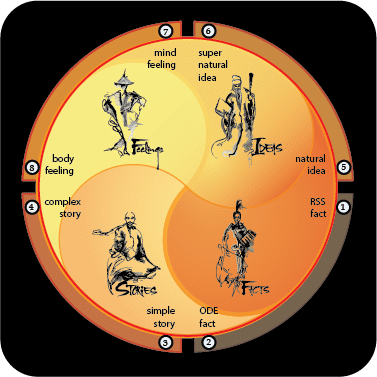Does evidence support the claim that learning something new changes your brain for good, or that learning can be undone if you stop doing what you learned for long enough?
Answering this with proper science would easily take many books. Except in rare cases, simple answers cannot address the true nature of anything this dense. And yes, I realize I sound like a world-class know-it-all who is talking out of my butt-hole. Fair enough. So how would I look to answer these questions? Start with this.
My way is to begin such a difficult task is with the first step in the Constellated Science method. No scientist, or anyone really, can properly answer a question without first defining their terms. Even here, I’d need to develop a list of the terms which I’d then need to define, beginning with the nature of the word, “learning.” But also the nature of “memory,” and “schools,” and “forgetting,” and “teaching,” and so on.
Where would I go next? With that first step I mentioned a moment ago. I call this step, “making a slate clearing list,” as it clears the mind. Literally, making this list allows you to identify the mind killer in this task; the feeling of certainty. Whenever you feel certain, this feeling closes your mind. After all, if you think you already know, why look? Ironically, it’s this focus on answers you already know which actually closes the mind.
As opposed to what? Curiosity. Whenever you feel curious, your mind is open. No coincidence, curiosity exists only when your mind focuses on new things, especially on unanswered questions. How exactly does a slate-clearing list create this feeling? It begins with a simple prompt into which you insert your topic. In the present case, I’d ask, “If I had access to an all-knowing expert on learning, what questions would I ask?” Then I’d let my mind freely spew thoughts.
My list? Just a few examples.
[Question 1] Can we actually, scientifically define the word, “learning?” By this, I mean can we truly say what learning is; its sine qua non; it’s essence? Here I’m not referring to dictionary-style definitions. Lists of single points, no matter how long, will never properly define anything. Rather, the true essence of learning. Can we define that? Then again, that’s the question at hand.
[Question 2] No definition can be called “proper” without also defining what this thing is not. Together, “what a thing is” and “what a thing is not” account for all possibilities of this thing. Here the complement to question 1 would be, “how do we define the state of mind wherein something has not been learned?” And does this lack of clear definitions explain why graduating students retain so little of what schools claim they have learned?
What I’m saying is, certainly, most folks, after graduating, rapidly lose their abilities to pass the same academic tests which schools claim prove they’ve learned things. But if passing tests isn’t a measure of learning, then what is and where does this leave us? It’s simple. But to see this, I’ll need to ask you to picture an example.
Picture the first time you tried to ride a bike vs the first time you felt surprised by that you were riding. In the former state of mind, you likely knew what tires were, where you were supposed to sit, and so on. None of this is learning. Rather it’s what I call, “knowing something exists.” As opposed to the learning that did occur when you felt surprised by seeing yourself actually ride.
Think about it. When you first rode a bike, none of those words or phrases mattered. You and the bike were somehow merged into something wonderful. More important, can you ever forget how to ride a bike? Not if you felt surprised by doing it. And here is the only true measure of learning. Pleasant surprise when you expect you don’t or can’t know something, or that you’ll fail. And to answer the OPs question, you can only learn new things, and once you do, you cannot ever unlearn it.
Sadly, most of what people think they’ve learned is really mere parroting of things some true expert has learned.
